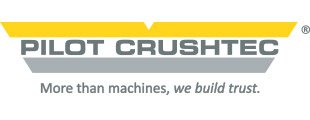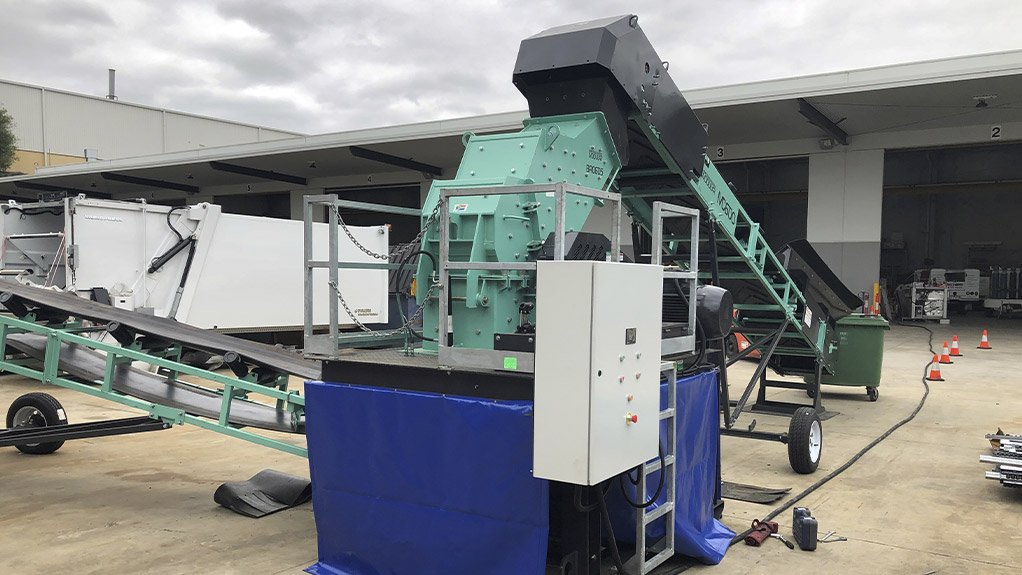

Big potential for glass recycling in South Africa


The Pilot Modular BR0605 HSI crusher is mounted on a heavy-duty skid frame, features a maintenance deck and is capable of handling up to 35 tph of throughput
Crushing equipment specialist Pilot Crushtec has several products that are ideal for the recycling of glass. While many of the company’s overseas customers have recognised this and are using Pilot Crushtec machines very successfully to recycle glass, the local market for this application has not grown at the same pace.
One of the reasons for the slower progress in glass recycling locally is simply the fact that South Africa does not have a strong recycling culture, says Charl Marais, Sales Manager South Africa at Pilot Crushtec. “Compared to European countries and also Australasia, South Africa is lagging. The problem is exacerbated by a lack of legislative support for recycling, particularly the recycling of glass.”
Marais notes that one potentially large market for recycled glass is road building. “Recycled glass can be used for road construction and this has been pioneered in the Nordic countries, the US and Australia,” he says. “We would love to see this success emulated in South Africa but the problem is that our relevant road construction standards – the COTO Standard Specifications for Road and Bridge Works – do not allow for its use.”
He cites the case of a road upgrade in the state of Victoria in Australia. “This was a ‘green’ project designed to use recycled materials to the fullest extent possible,” he says. “The road contains recycled glass from 190 million glass bottles, which might otherwise have found their way into landfills. The road aggregate containing recycled glass was supplied by one of Pilot Crushtec’s Australian customers.”
Marais says that there are many other applications apart from road building where recycled glass can be used.
“Recycled glass is a very versatile material,” he comments. “For example, it can serve as a sand substitute in sand blasting and water filtering applications and can also be used in decorative concrete and in the building of artificial sports tracks and golf bunkers. Safety is not compromised when crushed glass is used to replace sand, as the glass crushing process gives the crushed glass a ‘sub-angular’, which means there are no sharp edges.”
Marais does point out though that recycled glass is not always competitive with sand on cost. “Sand is a plentiful natural resource and, to compound the problem, much of the sand supplied in South Africa is sourced illegally and priced accordingly.”
Pilot Crushtec’s entry-level machine for glass recycling is the ROMPI bottle breaker, which is hand-fed and can handle around 1 500 bottles an hour. The crushed glass is deposited into 30 litre plastic containers. The ROMPI is designed to reclaim valuable space during transportation or storage by reducing the volume of glass waste by up to 80 % and it also eliminates the safety risks associated with handling empty bottles during the crushing process.
“The ROMPI is selling well and we have about 25 of these units in the field,” says Marais. “They’re perfect for small community entrepreneurs. For example, we have one customer in Soweto who collects bottles, crushes them and then sells the crushed product to a big glass manufacturer.”
For more demanding applications where high volumes are involved, Pilot Crushtec can offer the BR0605 horizontal shaft impactor and the VS100 and VS250 VS200 vertical shaft impactors, which can crush down to 0.5 mm -1 mm. One typical large-scale application is to be found in Gqeberha where a Pilot Crushtec VSI is being used to crush rejected windscreens down to a filter sand.
On the prospects for glass recycling in South Africa, Abelho says Pilot Crushtec is determined to grow the market. “We believe the benefits of glass recycling, especially from an environmental perspective, are huge,” he says. “We have the ideal machines to make it an economic proposition and our task now is to get this message out into the marketplace.”


